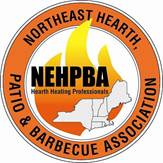15 February 2022

February 15, 2022
FOR IMMEDIATE RELEASE
NEHPBA calls for Massachusetts legislative leaders to halt S. 1333 and its devastating economic and climate impact.
Northeast Hearth, Patio and Barbecue Association says allowing municipalities to adopt their own energy guidelines for building permits will have severe negative effects on cost, emissions.
Sudbury, MA – The Northeast Hearth, Patio and Barbecue Association (NEHPBA) today urged the Joint Committee on Telecommunications, Utilities and Energy to oppose S.1333 because of its potentially devastating impact on energy costs and the overall cost of living for Massachusetts households, and the likelihood that the bill’s allowance of municipalities to mandate all-electric heating in new construction will actually increase carbon emissions.
“Allowing municipalities to adopt their own energy guidelines and regulations for building permits will prohibit them from reaching their energy emission goals,” said Joel Etter, President of NEHPBA and Senior Wholesale Account Manager for Hearth & Home Technologies. “Allowing for change faster than is economically and technically realistic will increase costs, increase emissions, and result in “dirty” energy in the Commonwealth.”
The Northeast Hearth, Patio & Barbecue Association is a trade association representing over 60 member companies supporting 350 families in the Commonwealth - the vast majority of which are independent “mom and pop” small businesses that are significant community contributors in the markets they serve across the Commonwealth.
As currently written, Senate Bill 1333 proposes to amend Massachusetts General Law, Chapter 143, and allow municipalities to require new building permits to be all-electric and prohibit the building of new fossil fuel infrastructure.
“These policies would result in a drastic increase in electric rates and cost of living, along with the possibility of inhibiting access to more affordable sources of fuel and power,” said NEHPBA Executive Director Karen Arpino. “These changes would have a major impact on the most vulnerable among us.“
NEHPBA recognizes the changing landscape of the energy and fossil fuel industry. Its members are committed to working with government officials and regulators at all levels to increase access to more sustainable and climate-centric fuel sources throughout our homes and businesses. But the challenges we have now must be addressed.
For example: the price of electricity has increased drastically over the last year – even as demand has remained consistent. On January 25, 2021 the wholesale price for electricity was $40/MWh. On January 25, 2022 the price had risen to $200/MWh. Average prices to date in 2022 are about 80 percent higher than 2021.
New sources of energy from renewables are years away from being able to supply a consistent load that will make a difference in fuel mix needs. And while demand for electrical power continues to grow, energy supplies to generate electrical power are falling further behind. This is creating a huge burden on our regional transmission grid, creating extremely high prices. Allowing 351 municipalities to decide their own energy regulations would be unpredictable.
“Electricity has not only become far more costly because we are no longer utilizing natural gas pipelines, but it is also far dirtier as a result,” said Arpino. “Natural gas is becoming more and more difficult to access or prohibited. That means we forced to import electricity that is generated using dirtier fuels such as coal and oil.”
According to data collected by ISO-New England, 12 percent of New England’s electricity in January was produced using oil, which is a dirtier fuel that emits more greenhouse gases. Over the last year, oil’s share of the fuel mix had never risen above 0.9 percent; in January 2021, it was 0.2 percent. Natural gas was used to produce 44 percent of our region’s electricity in January 2022—the lowest level in over a year.
As heating and transportation are electrified, providing the new infrastructure will be critical to a consistent and cost-effective transition to a low-carbon economy. NEHPBA supports the creation of legislation that will modernize the electric grid and account for the changes and upgrades to the electric system, transmission, and storage.
About the Northeast Hearth, Patio & Barbecue Association
Since 1985, the Northeast Hearth, Patio & Barbecue Association (NEHPBA) has represented the interests of the hearth industry in the Northeast. NEHPBA was originally incorporated in January 1985 as the Northeast Solid Fuel Alliance (NESFA) in recognition of the unique demands of business in the Northeast. In June of 1992, NESFA members voted to become the first affiliated member of the national Hearth Products Association (HPA) and became the Northeast Hearth Products Association (NEHPA). In 2002, NEHPA became the Northeast Hearth, Patio & Barbecue Association (NEHPBA) in conjunction with the merger of the national HPA with the Barbecue Industry Association to become the Hearth, Patio & Barbecue Association (HPBA), thus recognizing the diversification of the modern industry. The NEHPBA name has remained since 2002.
Members of the Northeast Hearth, Patio & Barbecue Association (NEHPBA) and its regional Affiliates are the leading companies that produce, sell, or service appliances and accessories in the hearth and barbecue industries in North America. Join today to take advantage of all the benefits your company will receive.
JOIN NOWServicing Massachusetts, Connecticut, New Hampshire, Rhode Island, Vermont, Maine, New York
Copyright © 2025. Northeast Hearth, Patio and Barbecue Association | All rights reserved.